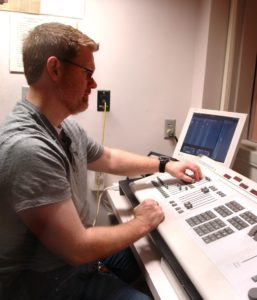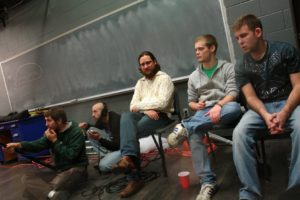by Director Lauralee Farrer
When sixth-century Benedictine monks stopped eight times a day to pray, their intention was to infuse menial work with the sacred by reminding themselves of the presence of God. They believed that being in the service of God can transform a temporal act into an eternal one, and the daily prayers were intended “to sanctify the day and all human activity.”
It’s a stretch for some to consider filmmaking a sacred calling, but there is little difference between plowing a field, making soup, cleaning laundry, and changing from a wide lens to a long one. The chores are not more or less sacred, but rather the purpose of the chore-doer. It is a deeply held belief in the Abrahamic traditions that all of life can be infused with the holy. Persian poet and mystic Rumi made the point succinctly: “The man pulling radishes pointed the way with a radish.” If pointing the way has eternal value, pulling radishes can be as sacred as preaching.
 A production assistant on our recent shoot in Huntington, Indiana, was overheard to bemoan, “All I do all day is run back and forth.” The process of filmmaking is hardest, in some ways, on the P.A.’s: they have youthful dreams of being film directors but start out feeling like servants. Keeping a set running smoothly requires a cadre of willing and indefatigable facilitators to cook, drive, pick up, clean up, arrange, and rearrange an infinite number of details. Hardest among the chores, to quote Milton, is the patience to “only stand and wait.” The whole process can grind to a halt for something as small as a missing prop or a crew that needs coffee, so every activity in the communal process of making a film is equally important.
A production assistant on our recent shoot in Huntington, Indiana, was overheard to bemoan, “All I do all day is run back and forth.” The process of filmmaking is hardest, in some ways, on the P.A.’s: they have youthful dreams of being film directors but start out feeling like servants. Keeping a set running smoothly requires a cadre of willing and indefatigable facilitators to cook, drive, pick up, clean up, arrange, and rearrange an infinite number of details. Hardest among the chores, to quote Milton, is the patience to “only stand and wait.” The whole process can grind to a halt for something as small as a missing prop or a crew that needs coffee, so every activity in the communal process of making a film is equally important.
We are filled with gratitude for those who cared for us in Indiana: for the churches and dorms and university offices and individuals who fed us; for the students who drove us back and forth to the airport or who spent days running errands; for Huntington University that gave us sweatshirts so we might better survive the cold; for the families and friends who donated money so that we could pay for things that could not be donated or purchased at thrift stores; and for the community of people who prayed from afar and helped us carry an array of burdens.
Primarily we are grateful to HU Digital Media Director Lance Clark and our own producer Matt Webb who managed the myriad of elements necessary for us to capture Compline’s story on camera. Their generosity of spirit sanctified our days, and made our work on this segment of Praying the Hours a terrific experience—a fine example of Martin Luther King Jr’s challenge: “anyone can be great because anyone can serve.”

